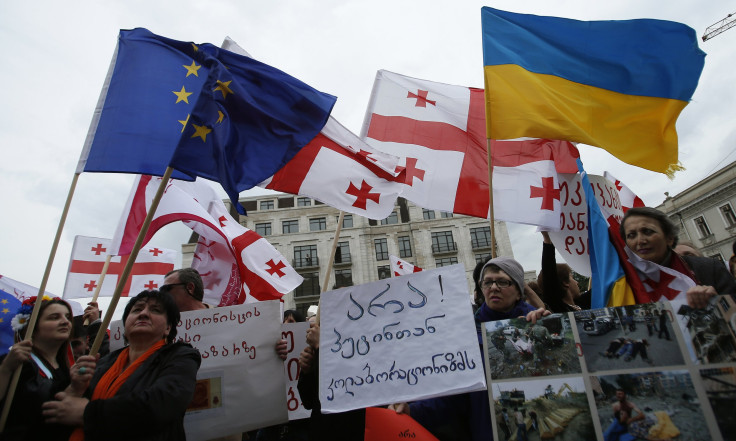Russian Influence In Donetsk And Luhansk Goes Far Beyond Ukraine's Borders

The separatist Donetsk and Luhansk regions in Ukraine held elections Sunday that saw the victory of pro-Russian candidates, and that no country except Russia recognized as legitimate, leaving the future of east Ukraine unknown. But clues about the regions' eventual fate may rest within the history of other ex-Soviet countries. Russia's significant influence on, and endorsement of, the winners of elections in Donetsk and Luhansk closely resembles the events that took place in the five-day war with Georgia in 2008, and the conflict that spawned the creation of the autonomous regions of South Ossetia and Abkhazia.
The events in eastern Ukraine may, in fact, be driven not by Russian expansionism, but by a desire to limit the reach of NATO into what Moscow sees as its corner of the world.
“Russia’s discourse has been framed in similar language to that which accompanied the war with Georgia in 2008,” said Sarah Lain, Research Fellow at the London-Based Royal United Services Institute for Defense and Security Studies. “Russia’s motivation in the Ukraine crisis has been not only to assert credibility as a world power, but also to prevent Ukraine, which Russia sees as a traditional ally and part of its traditional sphere of influence, from fully pivoting West to become pro-EU and pro-NATO.”
The parallels between Russia’s war with Georgia in August 2008 and the Ukraine conflict, which erupted in early 2014, are striking. Six years ago Russia recognized the newly-created separatist states of Abkhazia and South Ossetia, and promptly covered the region in Russian military bases. The move ended any ambitions that Georgia, under pro-American president Mikheil Saakashvili, may have had to join NATO. Likewise, the military influence in Donetsk and Luhansk, while denied by Russia, has been documented throughout the crisis. Eyewitnesses claim that Russian trucks full of munitions and rations frequently crossed the border from Russia into eastern Ukraine.
While the annexation of Crimea from Ukraine was the reason that the West applied sanctions against Russia, Crimea has now been absorbed by Russia, in a move that -- while unrecognized by any other sovereign state -- has failed to elicit any response beyond the sanctions.
Donetsk and Luhansk, on the other hand, may end up in the same political state as South Ossetia and Abkhazia: autonomous states not recognized by anybody except Russia, which treats then as part of its own sphere of influence. But the wider implications for the rest of Ukraine, as they were with Georgia, reach far.
“Russia wants a controlling stake in Ukraine like it has in Georgia, Moldova and Armenia,” Igor Sutyagin, a senior research fellow at London’s Royal United Services Institute for Defence and Security Studies, said. “And with that share of power, Russia can control (the) policies of the state. If (Moldova, Ukraine or Georgia) moves in the wrong direction, Russia just pulls the strings in those areas and the country falls into a more pro-Russian line.”
According to Sutyagin, Russia may have originally envisioned Crimea as a separatist-governed region it could use to influence Ukraine, but then Moscow saw a chance to annex the region outright. “Temptation became too much for them and they decided to take it back,” Sutyagin said. ‘There was no risk of an attack from the West, so the calculation was quite simple for Russia.”
But this left Russia without the leverage it needed to continue some level of control of Ukraine, and that’s where Donetsk and Luhansk came in.
Russia has made similar moves, aside from the conflicts in Georgia and Ukraine. Moldova’s Transnistria, inhabited by an ethnic Russian majority as opposed to the Romanian-speaking majority in the rest of the country, has been autonomous since Moldova emerged from the breakup of the Soviet Union in 1991. A ceasefire between the central government and separatists has been in place since 1992.
Those "frozen conflicts" within their borders mean those countries are less likely to be able to join NATO or the European Union, according to Sutyagin.
While Moldova has never been realistic candidates for NATO membership, Georgia and Ukraine have been in discussions to join the U.S.-led alliance since the early 2000s.
Russia’s actions in Georgia came after the country elected the pro-Western Saakashvili in 2008. Likewise, Russia's direct involvement in Ukraine came after pro-Russian president Viktor Yanukovych was ousted from power in early 2014, paving the way for a pro-western turn in Ukrainian government.
As for how long this situation of frozen conflict may last, experts say Europe and the U.S. should brace for the long haul.
“Russia wants the conflicts in these countries to be chronic,” said Ariel Cohen, director of the Center for Energy, Natural Resources and Geopolitics at the Institute for Analysis of Global Security. “It prevents countries like Ukraine and Russia from having a plausible case for joining NATO, because it’s a country with an ongoing conflict and NATO would not want to do that."
© Copyright IBTimes 2024. All rights reserved.






















